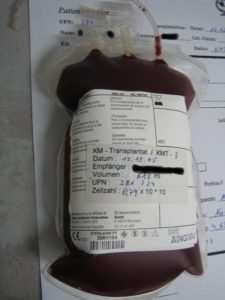
Recently Diagnosed or Relapsed? Stop Looking For a Miracle Cure, and Use Evidence-Based Therapies To Enhance Your Treatment and Prolong Your Remission
Multiple Myeloma an incurable disease, but I have spent the last 25 years in remission using a blend of conventional oncology and evidence-based nutrition, supplementation, and lifestyle therapies from peer-reviewed studies that your oncologist probably hasn't told you about.
Click the orange button to the right to learn more about what you can start doing today.
- You are here:
- Home »
- Blog »
- non-conventional therapies »
- Traditional Chinese Medicine- Cancer?
Traditional Chinese Medicine- Cancer?

Is Traditional Chinese Medicine (TCM) effective as a therapy for cancer? For my cancer specifically- multiple myeloma?
As is often the case, the issue of cancer therapies in general or my specific rare cancer, multiple myeloma, comes down to the available research. When I say this, I am referring to the first study linked and excerpted below.
Yes, there is a report of one myeloma patient doing well with TCM. There are some specifics about the specific therapy used, Huangqi Guizhi Wuwu Tang (HGWT), but no info about dosing or other important specifics.
Without reliable research, the cancer patient is likely to do what I did.
I underwent TCM in 1996 after I have relapsed after an autologous stem cell transplant. I knew that a relapse soon after high-dose therapy (less than a year) indicated that my conventional therapy options were limited so I began looking for other possible therapies.
I knew little about TCM, alternative therapies, complementary therapies, etc. Looking back, I would consider myself to be your average newly diagnosed cancer patient.
I don’t want to call myself “ignorant” but…okay, regarding cancer, I was ignorant.
The challenge that I faced were several-
- Learning about alternative therapies-
- Finding credible alternative therapies-
- Even communicating with the Chinese doctor-
I simply drove to Cleveland, Ohio’s Chinatown, went to a place called Asia Plaza and walked into what looked like a store for Traditional Chinese Medicine. I met with a woman who seemed to be the person I was looking for. After trying to communicate for a few minutes, she wrote down some sort of information for the women in another part of the store to use to provide me with several small bags of herbs. I was instructed to boil the herbs down into a sort of tincture and drink several ounces of the tincture several times a day.
I did as instructed for the next several weeks. I have no idea what the herbs were. The tincture smelled and tasted awful but I have to say that I’m alive today.
I guess I’m explaining all the above in order to explain what NOT to do as a cancer patient looking for TCM. My advice is to read the info below as well as the studies in an effort to learn more, know more before you begin drinking some sort of mystery TCM tincture.
Traditional Chinese Medicine (TCM) has been used for thousands of years to treat a wide range of conditions, including cancer. It encompasses various practices such as acupuncture, herbal medicine, dietary therapy, and qigong. While some components of TCM have shown promise in managing cancer symptoms and side effects of conventional cancer treatments, it’s important to note that TCM is not considered a standalone cure for cancer.
Here are some points to consider:
- Symptom Management: TCM may be helpful in managing symptoms associated with cancer and its treatment. For example, acupuncture has been used to alleviate pain, nausea, fatigue, and anxiety in cancer patients.
- Complementary Therapy: Some cancer patients choose to use TCM as a complementary therapy alongside conventional treatments like chemotherapy, radiation, and surgery. It can be integrated to help improve the patient’s overall well-being and quality of life during cancer treatment.
- Herbal Medicine: Some TCM herbal formulations have been studied for their potential anticancer properties. For example, compounds derived from certain herbs like Camptotheca acuminata have been used in the development of chemotherapy drugs.
- Individualized Treatment: TCM is often highly individualized. Practitioners take into consideration a person’s overall health, constitution, and specific type of cancer before recommending a treatment plan.
- Limited Scientific Evidence: While there is anecdotal evidence and some preclinical studies suggesting benefits of TCM in cancer care, rigorous scientific studies are limited. Randomized controlled trials (RCTs) are the gold standard for evaluating medical treatments, and more of these are needed to draw firm conclusions.
- Regulation and Safety: The quality and safety of TCM products can vary widely. In some cases, contaminants or adulterants have been found in herbal preparations. It’s important to seek treatment from qualified and reputable practitioners.
- Integration with Conventional Medicine: It’s crucial for anyone considering TCM for cancer treatment to do so under the guidance of a healthcare team that includes oncologists and TCM practitioners. Open communication between all members of the healthcare team is essential.
- Ethical Considerations: Patients should be informed about the potential risks and benefits of any treatment they pursue. It’s important to avoid treatments that could delay or replace proven, life-saving conventional therapies.
In summary, while there are aspects of TCM that may offer supportive care for cancer patients, it is not a replacement for mainstream cancer treatments. It’s crucial for individuals considering TCM to consult with their oncologist and other healthcare providers to make informed decisions about their treatment plan.
Several years of aggressive conventional oncologic therapies left me with a series of long-term and late stage side effects such as chemo-induced heart damage.
Traditional Chinese Medicine- Chemo-induced Cardiomyopathy
Have you been diagnosed with cancer? What type? What stage? Are you wondering about TCM as a complementary therapy for your symptoms and side effects?
Let me know, thanks- David.PeopleBeatingCancer@gmail.com
David Emerson
- Cancer Survivor
- Cancer Coach
- Director PeopleBeatingCancer
The therapeutic effect of modified Huangqi Guizhi Wuwu Tang for multiple myeloma: An 18-year follow-up case report
“We report a case of a female patient who was diagnosed with MM in 2000 at the age of 49. She received 9 cycles of multiple chemotherapeutic regimens mainly based on melphalan from September 2000 to May 2001. Though her condition was under control in some degree, she discontinued treatment due to significant side effects such as fatigue, hyperhidrosis, fever, chill, larynx mucosa ulcers, pharynx mucosa ulcers, and poor appetite. Instead, she sought treatment with TCM alone…
Up to the present, the patient has been using modified Huangqi Guizhi Wuwu Tang (HGWT) continuously for 18 years. In this prescription, Radix Astragali is an important herb. When the patient’s condition worsened, its dosage was increased from 30 to 120g. Besides, she has been eating Radix Astragali porridge or drinking Radix Astragali tea for almost 18 years at the same time…
Outcomes: Throughout the period, no obvious side effects have been observed and her health condition remains stable.
Lessons: Polysaccharides isolated from Astragalus membranaceus (Radix Astragali) and Polyporus umbellatus could promote maturation of dendritic cells. Polysaccharides and flavonoids isolated from Astragalus membranaceus could regulate bone marrow microenvironment by inhibiting secretion of interleukin (IL)-6, IL-12 p40 and bidirectionally regulating the osteogenic capacity of osteoblasts. Besides, Rhizoma Atractylodis Macrocephalae, another important component of the prescription, has inhibitory effects on osteolytic bone lesions. This case suggests TCM treatment may have a positive therapeutic effect on MM. Modified HGWT, especially the Chinese herb medicine Radix Astragali could potentially be an alternative option for the treatment of MM. Both pharmacological studies and randomized clinical trials are needed in the future…”
Traditional Chinese medicine as a cancer treatment: Modern perspectives of ancient but advanced science
“Abstract- Traditional Chinese medicine (TCM) has been practiced for thousands of years and at the present time is widely accepted as an alternative treatment for cancer. In this review, we sought to summarize the molecular and cellular mechanisms underlying the chemopreventive and therapeutic activity of TCM, especially that of the Chinese herbal medicine‐derived phytochemicals curcumin, resveratrol, and berberine…
CONCLUSIONS AND PERSPECTIVE-
In recent decades, increasing numbers of patients have been attracted to use TCM as an adjuvant therapy option for various diseases. In particular, TCM‐based CHM has increasingly been shown to exhibit promising therapeutic effects as an adjunctive treatment following surgery, chemotherapy, radiotherapy, or other types of therapy for cancer patients worldwide.
CHM is considered a gift of nature and these compounds derived from herbs have the advantage of availability, efficacy, and relatively low toxicity compared with chemotherapy. Evidence has confirmed that TCM in combination with chemotherapy or radiotherapy is capable of promoting the efficacy of and diminishing the limitations and drawbacks induced by chemotherapy and radiotherapy.232
A considerable quantity of research has been performed to elucidate the mechanisms underlying the beneficial effects of TCM in cancer treatment. As mentioned above, TCM can possibly regulate oncogenes and tumor suppressor genes, epigenetic modification, the microenvironment, and cancer stem cells.
The objective of this review was to contribute to a clearer understanding of TCM as an adjuvant therapy for cancer. The number of studies on curcumin and resveratrol in cancer therapy are in much greater abundance than other CHM‐derived phytochemicals, so there is much to learn about those compounds…”
Traditional Chinese medicine in the treatment of symptoms in patients with advanced cancer
“Abstract: Patients with advanced malignancies are often suffered from deficient vital qi, which is clinically presented as cancer-related pain, anorexia, nausea/vomiting, fatigue, fever, indigestion, and constipation, which severely lower the quality of life and even shorten the survival of these patients. Traditional Chinese medicine (TCM) has a long history and rich experiences in treating malignancies. In addition to surgery, radiotherapy, chemotherapy, and other modern therapies, the TCM-based treatment can dramatically alleviate the clinical symptoms and improve the quality of life. This article analyzes the TCM treatment for the cancer pain, nausea/vomiting and cancer-related fatigue in patients with advanced malignancies, and the TCM-based emotional care for these patients are also discussed…”


